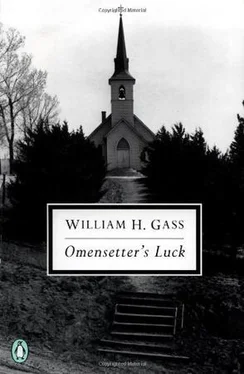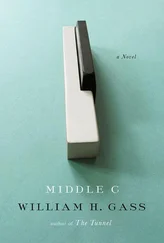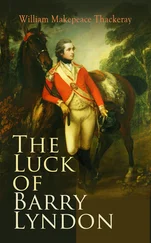William H. Gass
Omensetter’s Luck
To the editors of Accent, when I most needed it, gave me generously of their friendship. The first two sections of this novel, in somewhat different form, appeared originally in their magazine, and although the magazine has ceased to exist, I like to think that I shall always be writing for it.
The Triumph of Israbestis Tott
Now folks today we're going to auction off Missus Pimber's things. I think you all knew Missus Pimber and you know she had some pretty nice things. This is going to be a real fine sale and we have a real fine day for it. It may get hot, though, later on, so we want to keep things moving right along. And now I'm going to begin the sale with the things back here by the barn. You've all had a chance to look at everything so let's bid right out for these fine things and keep things moving right along. The sale is cash as usual and Missus Grady is inside to take care of that. The ladies of the Methodist Church are kindly providing the lunch. You can see their tables across there in Missus Root's lot and I know you'll want to help all these ladies just as they are helping you. It’ll be good I know. All right I'm going to begin the sale back here so if you folks will follow me we'll get started.
It was his first excursion. He had tottered about in the yard for several weeks despite the high grass, and for three months he had practiced in his bedroom and in the living room and halls, but he was going to try himself in earnest now. He'd said he'd see the summer under and he had. The grass was burned. There were flecks of yellow in the cotton trees. The weeds were wilted and long in seed. Where were all his friends?
Once he went out in the morning down the street and everyone was up and he knew everyone. He could hear the anvil ring and Mat's mild voice between the ringings singing to the horses. You could shout from one end of town to the other and be heard. And in the morning Mat was like a bell.
Israbestis rubbed his cheek. Who was the man with the gold teeth?
He was out of touch. He used to stop at Mossteller's place. Mossteller was a quiet fellow but he loved to joke. He used to stop in Lloyd Cate's on the way. Lloyd would put his foot up on the stove and say he'd overet himself and swear that it was cold if it was May. He and Lloyd would talk until the train whistled for Gilean. When the whistle blew a second time, Lloyd would take his foot down and they would both go and stand in front of the store and stretch. Well, Lloyd would say, I've got to get at it. Israbestis would shake his head sympathetically and walk off to the station.
People passed impatiently around him. They walked so fast. A crowd was gathering by the barn. Its paint was scaling badly. The roof sagged toward a thorn tree. I caught a kite in there, he said. Thee main door hung by one hinge. Windows were broken and the darkness jagged. The house, however, was square and firm, beautiful everywhere, without a crack, each brick made by hand and laid by a master. The sound of the crowd grew as he came slowly along. All along the front were tall narrow windows Lucy Pimber showed candles in while it snowed on the carolers.
Sam raised his hand and peered between his missing fingers. Everybody laughed. People inched among the chairs and couches on the lawn or sat in rocking chairs and talked or leaned against divans and talked, shading their eyes with their hands. They handled vases, fingered silver spoons, smoothed hand-quilted quilts. On the shaded porch the women squeezed themselves between card tables set with tilting towers of china cups, bubbled colored glass and painted plates. In the back, by the barn, the men gathered in serious pairs to smoke, heft heavy implements, and think. Under the lamps at a side of the house, young children sat and fussed with the laces of their shoes. Sam Peach yelled, looked at his fingers gone, and spat. Everybody laughed, and he held up between his missing fingers a ball of twine and with his full-fingered hand a fine old saw, a rope, a rubber mat, a can of lime; while in high-backed and formal chairs, beneath the scattered shade of half-dead elms, old ladies and old canes leaned together and nodded jerkily. Too bad, they said. Too bad. Too bad.
Not much of a woman. Mean, thin, and silent. Samantha's friend. He excused himself when bumped.
I saw this house go up, Israbestis said. First on the street.
That so?
I saw the cellar dug and the first brick laid. I was in this house the very day Bob Stout, who built her, fell from the Methodist steeple.
That so?
He fell on the iron fence that used to go around it. Parson Peach, he'd just come then — no, no, it was longer ago than that, Huffley's day it was — Huffley was a builder — took Furber's place-anyway, Huffley had the fence torn down.
That so?
It was funny about the fence because—
Lutie Root? It was her lot across the street. Was that the one her old man got in a swap for a flock of geese? Yes. There was a story. No. That wasn't Lutie Root. She had a harder eye, as hard an eye as her old man had, like translucent rock. She went in the winter. He'd forgot. Hard eye and all, paler and paler till it went out. Who were all these people?
Sam Peach held up a set of jelly molds, a length of screen, an antique drinking cup he claimed was pewter but was not, a box of bolts, a rake, rope in a tangled figure-eight. Sam wiped his face with a spotted cloth he'd knotted to his neck and nodded to the crowd. He exclaimed how hot it was, remarked how hard he worked, in what repair a wooden wringer was. His face was flushed from shouting and the waving of his arms and while he talked he switched from cheek to cheek tobacco with his tongue and when he spat he made a wide and running stain upon the ground. Sam smiled his dark brown teeth. He pointed to a flaw. He threw apart his arms. His nose twitched with harmless honesty. He told what he would use a crooked miter for if he had one, and said how much his missing fingers brought the day he'd knocked them down, and how he'd sold the saw, too, for a dollar more. Everybody laughed and bid. Sam tipped his broad-brimmed hat. He winked, and the friendly lines by his eyes drew in. His wife marked down the sale. They both moved on and with them moved the crowd and everybody's laughter.
I don't know that fellow, Israbestis thought.
I saw this house go up, Israbestis said. First on the street.
Oh?
They built things those days—
The summer had been hot. The ground was hard. The drive was dusty. Cars had been driven in the drive and dust raised. The dust had settled on the grass by the drive and turned it gray. Children had written their names on thee tops of dressers. Wasn't anybody going to shake his hand?
Quite a sale, lsrabestis said.
Lot of junk.
Oh no, not—
He thought he knew the fellow with the black cheroot. God if he didn't look like Hog Bellman. Israbestis felt his stomach tumble. Gas. Italians, he'd heard, had bought it. It was such a big house. Somehow he forgot there were Italians. In those days there weren't many. Sometimes they came to repair the railroad. Or were they Mexicans? Sicilians? Did it make a difference? It always seemed so far away for Italians. There were Italians of course. More and more. And now in this house that used to blaze with lights.
You seen Miss Elsie Todd?
Who?
Maybe McCormick or Fayfield? They used to come in a lot.
Hog Bellman. A high white hat on him. My god. Hunting in the marshes in the time of high water. Mat making them be quiet. Not a bird but the rush of water. Hog Bellman. My god. There's the chief. Good.
You get around pretty good, Israbestis said.
I get around fine. I come to all of them. I never miss a one. Rain or shine. I never miss. Don't see anybody much any more. Don't see you much, Tott, been sick?
Читать дальше












![William Frith - John Leech, His Life and Work, Vol. 2 [of 2]](/books/748201/william-frith-john-leech-his-life-and-work-vol-thumb.webp)